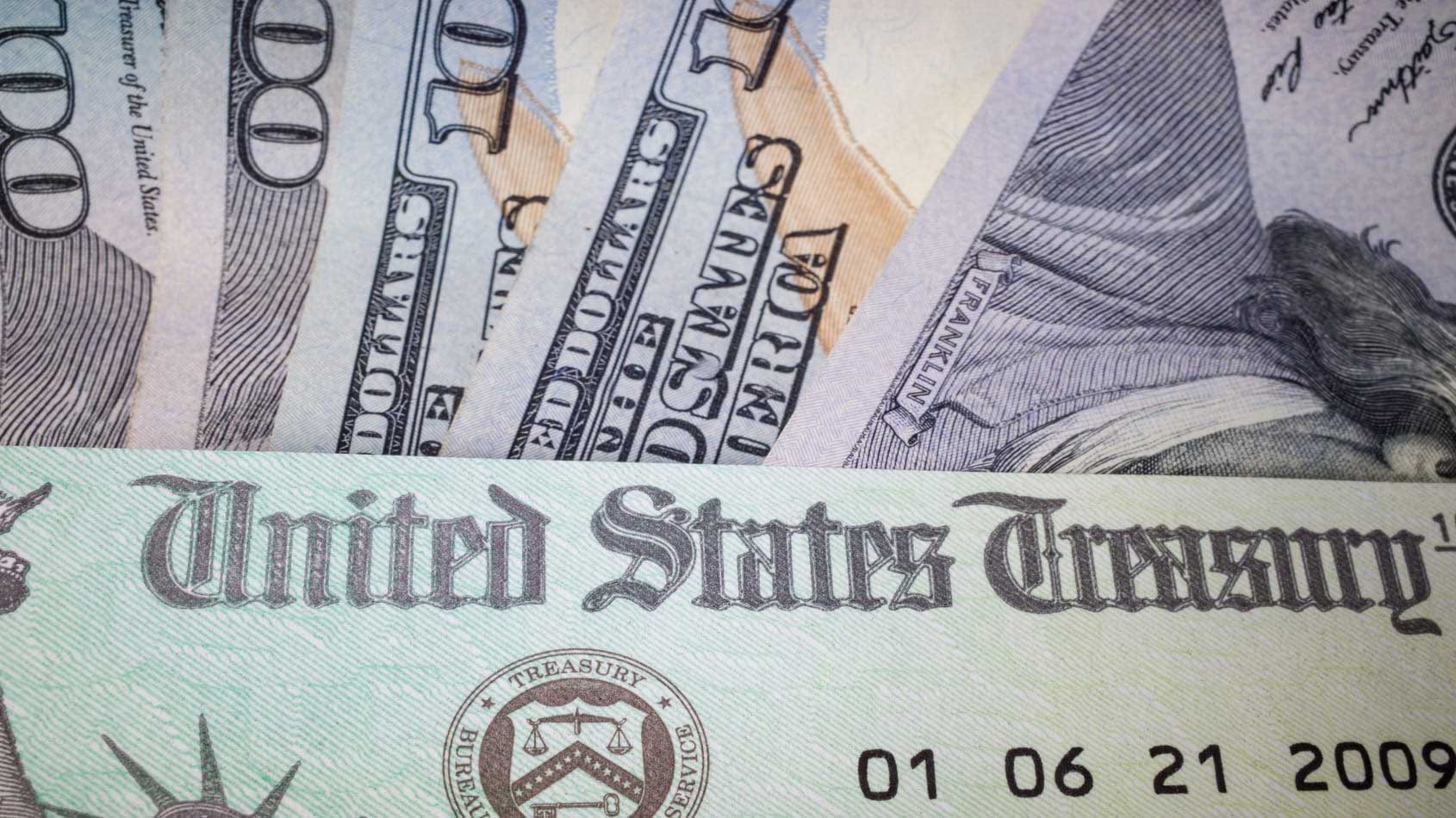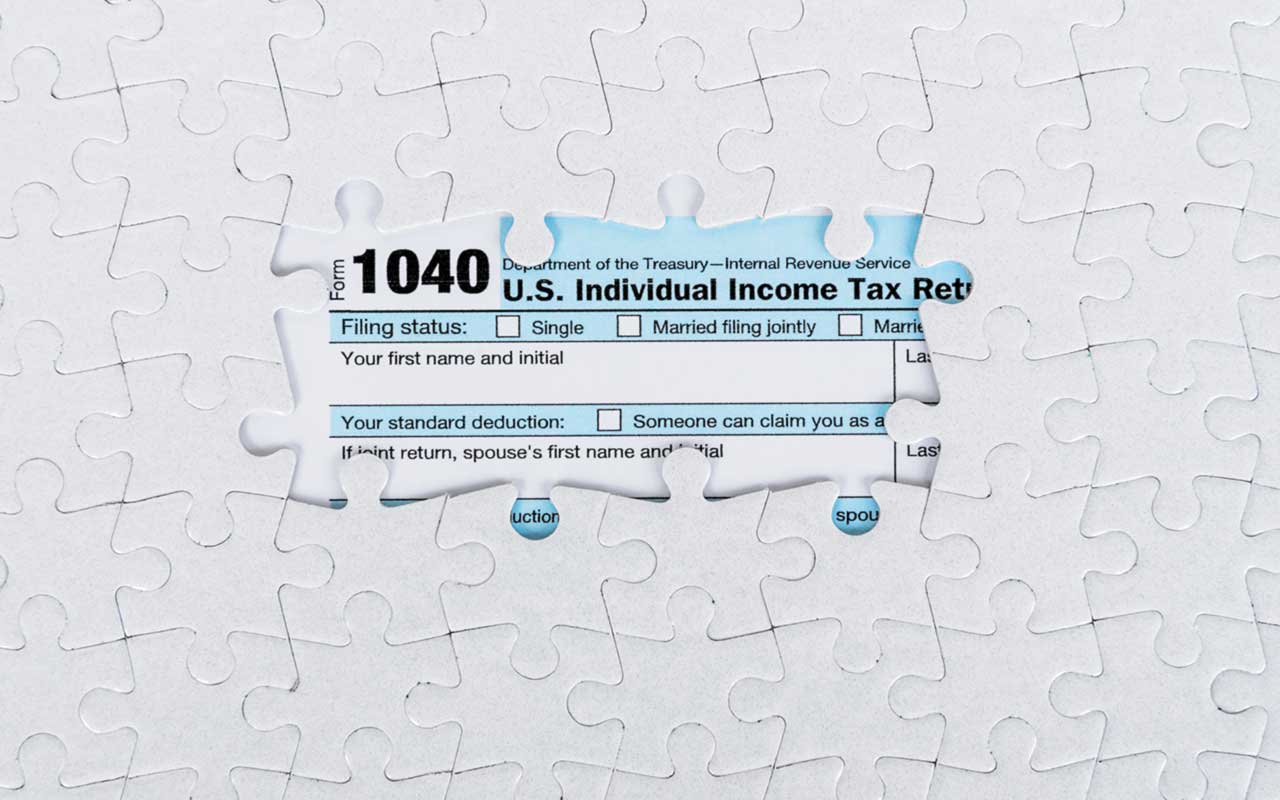What to Know About the Tax Extension Deadline on October 15
Kiplinger.com tax editor Rocky Mengle joins host Ryan Ermey to discuss what you should know about the October 15 tax extension deadline. Also, Kiplinger's car guru David Muhlbaum offers tips on preparing your ride for winter.
Profit and prosper with the best of Kiplinger's advice on investing, taxes, retirement, personal finance and much more. Delivered daily. Enter your email in the box and click Sign Me Up.
You are now subscribed
Your newsletter sign-up was successful
Want to add more newsletters?

Delivered daily
Kiplinger Today
Profit and prosper with the best of Kiplinger's advice on investing, taxes, retirement, personal finance and much more delivered daily. Smart money moves start here.

Sent five days a week
Kiplinger A Step Ahead
Get practical help to make better financial decisions in your everyday life, from spending to savings on top deals.

Delivered daily
Kiplinger Closing Bell
Get today's biggest financial and investing headlines delivered to your inbox every day the U.S. stock market is open.

Sent twice a week
Kiplinger Adviser Intel
Financial pros across the country share best practices and fresh tactics to preserve and grow your wealth.

Delivered weekly
Kiplinger Tax Tips
Trim your federal and state tax bills with practical tax-planning and tax-cutting strategies.

Sent twice a week
Kiplinger Retirement Tips
Your twice-a-week guide to planning and enjoying a financially secure and richly rewarding retirement

Sent bimonthly.
Kiplinger Adviser Angle
Insights for advisers, wealth managers and other financial professionals.

Sent twice a week
Kiplinger Investing Weekly
Your twice-a-week roundup of promising stocks, funds, companies and industries you should consider, ones you should avoid, and why.

Sent weekly for six weeks
Kiplinger Invest for Retirement
Your step-by-step six-part series on how to invest for retirement, from devising a successful strategy to exactly which investments to choose.
Ryan Ermey: Tax day is next week -- if you filed for an extension, that is. Kiplinger.com tax editor Rocky Mengle joins the show to break down the rules around extensions and what you need to know before filing in our main segment. On today's show, Kiplinger car guru David Muhlbaum fills in for Sandy for a discussion on preparing your car and home for winter. And we crack into another category's worth of financial Jeopardy questions. That's all ahead on this episode of Your Money's Worth. Stick around.
- Episode Length: 00:28:59
- Links and resources mentioned in this episode
- SUBSCRIBE: Apple Google Play Spotify Overcast RSS
Ryan Ermey: Welcome to Your Money's Worth. I'm Kiplinger's associate editor Ryan Ermey and Sandy Block is not with us today, but our friend David Muhlbaum, who's been on the show a few times is ably filling in. David, thank you for coming on.
David Muhlbaum: My pleasure.
From just $107.88 $24.99 for Kiplinger Personal Finance
Become a smarter, better informed investor. Subscribe from just $107.88 $24.99, plus get up to 4 Special Issues

Sign up for Kiplinger’s Free Newsletters
Profit and prosper with the best of expert advice on investing, taxes, retirement, personal finance and more - straight to your e-mail.
Profit and prosper with the best of expert advice - straight to your e-mail.
Ryan Ermey: So the talking points that Sandy and I wanted to hit in the beginning of the show today were on winterizing your home and car, which is funny to me as we record today... Washington D.C. is oh, about a thousand degrees outside. But it is the season that you should start thinking about preparing for colder weather. And since I don't have a car, thought that you would be the right guy to talk about the automotive aspects of this since you are in fact Kiplinger's car guy, the author of our DriveTime column. So I imagine the big thing when it comes to your car for winter is tires.
David Muhlbaum: That's right. That's right. And just one thought about the weather, you know, it snowed like three feet in Montana?
Ryan Ermey: I did see that. Saw a guy like diving into it.
David Muhlbaum: So, if those people weren't ready by October, well-
Ryan Ermey: Yeah, fair enough.
David Muhlbaum: So yeah, tires are the big thing and most people don't get snow tires or what they call winter tires anymore. But I and others would like to make the case that winter tires could really save your bacon. And so here's an anecdote. So next time you're out in snow, if you are somewhere it snows, to try to see what's the first vehicle you see in the ditch?
Ryan Ermey: Right.
David Muhlbaum: My bet is it's an all-wheel drive vehicle.
Ryan Ermey: Oh really?
David Muhlbaum: Yeah.
Ryan Ermey: See I would've guessed like a little Honda Accord or something.
David Muhlbaum: Maybe. But here's the thing about the all-wheel drive is that all-wheel drive, and to a lesser extent technologies like stability control and ABS have given people a sort of a false sense of security in snow. Like most of the times when people-
Ryan Ermey: Oh, I see.
David Muhlbaum: ...when people want an all-wheel drive, get an all-wheel drive car, they're thinking, "This is going to be good in snow."
Ryan Ermey: Right.
David Muhlbaum: And it is, but only in one parameter of driving in snow and that parameter is acceleration. Driving all four wheels helps you get up to speed more quickly. It doesn't matter what tire's mounted, you will accelerate more smoothly and safely, et cetera. The problem is it does nothing to slow you down or help you get-
Ryan Ermey: Decelerate.
David Muhlbaum: Yeah.
Ryan Ermey: Right, right.
David Muhlbaum: And so the miracle cure, if you will, is winter tires. And I make the case, I do sometimes when people come to me for advice, that it is a better deal to buy the front-wheel drive or rear-wheel drive option of whatever vehicle you're looking at instead of the all-wheel drive and get a set of winter tires instead.
Ryan Ermey: Okay. And so those are going to help you have more what? More traction?
David Muhlbaum: More traction. That is the key word. So you know, things like stability control, they help work with the traction that's available, but the only thing that increases the amount of traction that's available is that winter tire.
Ryan Ermey: Alright. So what are a couple little things that people can do beyond getting a whole new set of tires to just prepare their car for colder months?
David Muhlbaum: Well, let's assume you've got the scraper in the car.
Ryan Ermey: Sure. Which everyone always... it's somewhere, right? It's under one of the seats.
David Muhlbaum: Somewhere, somewhere. Yes. Down there with the old fries and the nasty... so dig it out now before it's a horrible experience.
Ryan Ermey: Yeah.
David Muhlbaum: Yes. A scraper. And that's one thing to have in the car. Another thing to consider is the condition of your wiper blades because they are critical to winter visibility. Another thing to consider is an emergency kit.
Ryan Ermey: Yeah.
David Muhlbaum: Now these can, I mean you can just keep going when it comes to an emergency kit. The one I like to advise for, well basically anyone, it's not even really a question of snow weather, but it is certainly helps, is to get an emergency blanket. One of those silver space blankets.
Ryan Ermey: Yeah, yeah.
David Muhlbaum: And that's really it.
Ryan Ermey: Oh. That's all you need?
David Muhlbaum: That's it. But you put it in the glove box or the console, not in the trunk. The trunk is where you would put emergencies kit stuff that's snow specific, like maybe a candle for melting snow and a can in which you melt it, you know?
Ryan Ermey: You know, one of those triangle guys.
David Muhlbaum: A triangle, yeah. Maybe some kitty litter or some traction device. A tow strap. You know, I mean that's serious stuff for a serious cold weather.
Ryan Ermey: Right.
David Muhlbaum: But the emergency blanket upfront is my, sort of argument that everyone should have this. And the point is this, if you're in an accident, if you go off the road somewhere in an accident that's bad enough that you're perhaps trapped in that vehicle in snowy weather and nobody's... and your phone isn't working, you might not be able to get out of the car and get back to the trunk to where the real stuff is.
Ryan Ermey: Right. Right.
David Muhlbaum: This should be in hand's reach.
Ryan Ermey: I gotcha.
David Muhlbaum: Arm's reach.
Ryan Ermey: So all excellent advice. I want to run... You know, it's funny I'm not a car... I don't have a car and I don't really... I mean I live in a house, but I'm not a homeowner, but I do have some advice for winterizing your home big and small. One is that you need to get your heater inspected and for about $80 to $100 dollars a technician will come inspect the furnace and make sure the heat pump and the system is clean and in good repair and can measure carbon monoxide leakage, is something that's worth the money. And if you act soon -- and this is why we give this kind of advice in October -- it'll keep you from having to be the 200th person in line and you're going to want to make sure that the person is, you know, super legit. So I would go through The Air Conditioning Contractors of America.
Ryan Ermey: You're going to want... a small thing is that you want to reverse your fans. Do you know which way your fans rotate in your house?
David Muhlbaum: What?
Ryan Ermey: Yeah, I mean they can rotate clockwise or counterclockwise.
David Muhlbaum: You mean so that the returns become the blowers and the blowers the returns?
Ryan Ermey: Like a ceiling fan.
David Muhlbaum: Oh, the ceiling fans.
Ryan Ermey: Ceiling fans.
David Muhlbaum: Yeah, I'm with you now. Okay.
Ryan Ermey: Yeah, so if you have them in a clockwise direction, after you turn on your heat it'll produce an updraft and push warm, heated air down into your room, which should let you be able to set your thermostat lower. You're going to want to prevent ice dams and this can be part of a larger home energy audit. Ice dams can cause melted water to back up and flow into your house. That's bad news.
David Muhlbaum: Right. So step one, clean the gutters.
Ryan Ermey: Well, yes, and not only that but make sure the gutters that go down into the drain pipes, that they're going a couple of feet away from the house as well. I'm making hand motions to you as the people aren't going to be able to see, but you know, a couple of feet away from the house. You're going to want to caulk your windows and doors if there's a gap in a window or doorframe that's bigger than a nickel. You're going to want to apply some exterior caulk.
David Muhlbaum: I got one for that.
Ryan Ermey: Oh yeah?
David Muhlbaum: Yeah. Well, so sometimes you have a window that doesn't fit quite right or you don't have the money to replace right now, but it leaks and during the winter you're like, "I can live without opening or closing that window." There's a product called rope caulk, which is like rope, like R-O-P-E, and basically it's a sort of temporary caulk that you can put little strips in where there's a leak and then come spring you're like, "I want that window back."
Ryan Ermey: Just take it right off. Perfect.
David Muhlbaum: Comes right out.
Ryan Ermey: I love that. And then the last thing I wanted to mention, and I love this because, I don't know, it's like, kind of probably just reminds me of Mary Poppins is that you'd call the chimney sweep. I don't know anyone who employs a chimney sweep, but if you have a chimney and you have a fireplace and you like to light the log and everything, you're going to want to make sure that you're not going to have a chimney fire or some kind of carbon monoxide issue. So do it now. Search for a sweep from the Chimney Safety Institute of America. You'll probably pay $50 to $90 bucks for an inspection, $100 to $300 bucks for cleaning. And you know, you can light the yule log, maybe serve the eggnog and...
David Muhlbaum: And it's not something you want to DIY. I mean, I'm like pathologically DIY, but chimneys, nah, no.
Ryan Ermey: Yeah, not going up in the chimney. So there you have it folks, be prepared for winter. Even if, like us, you're in the midst of 90 degree heat this week, that should dissipate soon. And being prepared early is the way to go.
Ryan Ermey: Up next, everything you need to know about tax extensions with Rocky Mengle. Don't go anywhere.
Ryan Ermey: We're back and I'm here with Rocky Mengle. He's the Kiplinger tax editor filling in very ably for our usual a tax expert Sandy today. And we're coming up on October 15th which is the due date for a 2018 extended tax returns. And so that's what we're talking about today. Rocky, thank you so much for coming on.
Rocky Mengle: Not a problem. Happy to be here.
Ryan Ermey: So I guess the first question out of the gate here is who does this actually apply to?
Rocky Mengle: Well you had to have requested an extension back in the spring, before April 15th, in order for this October 15th extended deadline to apply. And there are two ways that you can request an extension, or you should have done this. Either file form 4868. You could have filed that either on paper return or electronically, or make an electronic tax payment for part of what you expected to owe. And then that triggers an extension and that's it. You don't have to have a good reason or anything like that. The IRS says fine, just file by October 15.
Ryan Ermey: Although we've made the distinction that it is an extension for filing and not an extension for paying, you still have to have paid.
Rocky Mengle: You still have to paid in order to avoid interest and penalties. If you want to avoid penalties, you have to pay at least 90% of what you ultimately owe by April 15th. And interest, whatever you don't pay that's going to start adding up on April 16th.
Ryan Ermey: So are there certain kinds of people who were sort of... You know, is it automatically afforded more time? I seem to remember something about disaster victims or military personnel.
Rocky Mengle: Yeah. Disaster victims are often given extensions for filing and paying. You know there's a tornado or a flood or a hurricane come through that area and the IRS will typically say, "Okay, if you're affected by this natural disaster," if it's a federally declared natural disaster-
Ryan Ermey: Right. The right kind of natural disaster.
Rocky Mengle: The right kind of disaster. But just not a regular summer storm that knocks a limb off a tree-
Ryan Ermey: A personal disaster.
Rocky Mengle: Right. Then they'll typically say, "Okay, if you have a filing or payment deadline coming up between this date and that date,we'll push it back." So some people who were victims of natural disasters could have a filing and payment date after October 15th. Military personnel, they also have some special provisions that allow them to file after October 15th. Particularly if they are in or were in a combat zone. There's a whole set of rules and that can be pushed out, you know, additional six months or even three and a half months after that. Or if they are stationed overseas, there are provisions that could push it back to mid December. And actually people living abroad who aren't in the military can also take advantage of those rules to push it back to mid December with IRS permission.
Ryan Ermey: Right. So as you've mentioned, if you file late or if you pay late the wrong way, you're going to end up paying interest and penalties. But let's say some of our readers have done this the right way, they've filed for their extension properly, what are the forms they should, or documents or what have you that they should be getting together now as they prepare to file by the extended deadline?
Rocky Mengle: Okay. Well it's basically the same as if you were filing on April 15th. So you want a copy of your previous year's tax return. Particularly if you're filing electronically, you're going to need information off of that to be able to do the e-filing. You want to collect your receipts for any expenses that you plan to take deductions for, charitable contributions, that sort of thing. You want your W-2 forms from your employers. If you had some gambling winnings, if you're fortunate enough to...
Ryan Ermey: Never in my life, Rocky.
Rocky Mengle: Then you would have gotten a W-2G.
Ryan Ermey: Yeah, never heard of it.
Rocky Mengle: And you want to have that on hand too. Me neither, me neither. I've had plenty of gambling losses, but not too many gambling wins, so...
Ryan Ermey: Oh, yes sir.
Rocky Mengle: 1099 forms. There are all kinds of 1099 forms for different types of income. If you're a freelancer for instance, you should be getting a 1099-miscellaneous, 1099-R for retirement plan distributions, there's 1099 for dividend income, interest income, et cetera. 1098 forms for your mortgage interest payments. And if you have student loan interest you can look for a 1098-E. Social security numbers, you want to make sure you have those available for yourself, your spouse, your dependents.
Ryan Ermey: I should hope so.
Rocky Mengle: Yeah. One thing new this year, Ryan, is that in order to claim the child tax credit, you have to have your child social security numbers so-
Ryan Ermey: Oh, okay.
Rocky Mengle: ... that's new this year.
Ryan Ermey: So a couple other things to consider before we get to this October 15th deadline. And I can't remember which Kiplinger publication I saw this in, I'll see if I can find it to put it in the show notes if I can, but there's something about if you contributed too much to an IRA or if you have a self employed IRA, what's the deal there?
Rocky Mengle: Yeah, they're two tax tips here that are tied to the October 15th deadline. First, as you probably know, or listeners probably know that there's a limit to the amount of money you can contribute to an IRA each year and in 2018 that was a $5,500 for most people. If you're over 50 you can bump that up $1,000 to 6,500. If you contributed over those amounts in 2018 you have until this October 15th to withdraw that money and any earnings on that money in order to avoid a 6% penalty from the IRS.
Rocky Mengle: If you're self-employed, you have until October 15th to set up or make contributions to a simplified employee pension plan, IRA, or SEP IRA. Let me also add that for both of those procedures, you had to have filed for an extension back before April 15, so if you forgot to do that then...
Ryan Ermey: SOL.
Rocky Mengle: Yes.
Ryan Ermey: And that sort of brings me to the last thing I wanted to mention, which is maybe you screwed up this year and you didn't get the extension when you really needed one. What are some good reasons going into our next deadline here, the April deadline, what are some good reasons why someone might want to delay filing their tax return? And conversely, why might someone want to avoid doing that?
Rocky Mengle: Okay. Good reasons. A complicated return.
Ryan Ermey: Yeah.
Rocky Mengle: You know, you just want more time to figure things out. And this year, you know, with the new tax laws kind of kicking in I think a lot of people probably took an extension earlier this year just for that purpose because they wanted to get a better feel for the new tax landscape. So that's one. Let's say you having problems getting a W-2. One example that comes to mind is let's say your employer went out of business and you can't get ahold of them-
Ryan Ermey: Sure. That would be a problem.
Rocky Mengle: That would be a problem. You know, you lost a receipt, an important receipt that you need for a deduction or a credit and maybe you got to track down a duplicate. So that could be a reason. Of course, a family tragedy, particularly right before the April 15th filing deadline, that might be a good reason for extending. Or just have some other kind of change in circumstance in your family. You got married, have a child and you want a little bit more time. Or just because it's very hectic, or because you want to learn about the new tax laws that are going to apply to you in your new situation.
Rocky Mengle: And then what was the other?
Ryan Ermey: Just sort of if you want to avoid-
Rocky Mengle: If you want to... Yeah. Well first of all, if you're due a refund, putting off the return just means you're putting off getting that money back and being able to put it in your pockets.
Ryan Ermey: Right.
Rocky Mengle: So, and that doesn't make too much sense. And if you owe taxes, in a sense you still have to pay by April 15th in order to avoid the interest and penalties. You know, there's really no advantage to postponing if that's the only reason. If you're just trying to buy time, if you don't have one of those other good reasons we're talking about. And, you know, you just kind of shooting yourself in the foot.
Ryan Ermey: Alright, well Rocky, thank you so much. Excellent work. As always, be sure to keep up with all of Rocky's work on taxes on Kiplinger.com and Rocky, would you mind sticking around for this last segment here?
Rocky Mengle: Sure, no problem.
Ryan Ermey: Alright, fantastic. We'll be right back folks.
Ryan Ermey: Think you can nail a financial category on Jeopardy? See how you stack up next.
Ryan Ermey: We're back and before we go, both of our guests today have agreed to indulge me in a quick round of financial Jeopardy. I mentioned the last time we did this that there was only one ever Jeopardy round that the category was actually personal finance, but there are plenty of financial categories. Today we're going to use a category from January 19th, 2018 for those of you who might remember, I guess. The category is financial gobbledygook, which we deal with an awful lot here at Kiplinger's.
Ryan Ermey: Muhlbaum, I believe you actually won the last game playing against Sandy and so as the returning champion, you can select the clue. We're going to go... you know, just a quick hand raise here because we don't have buzzers clearly, but-
David Muhlbaum: Because that works out really well on radio.
Ryan Ermey: Right, exactly. Look, I'm going to call on you just like Alex Trebek calls on people.
Ryan Ermey: You know you have 200, 400, 600, 800, 1000; select a value.
David Muhlbaum: 400, please.
Ryan Ermey: The $400 clue, don't get them mixed up, ETF means exchange-traded these. EFT means electronic these transfer. Rocky.
Rocky Mengle: Funds transfer. Or what is funds transfer?
Ryan Ermey: Yes. You have to answer in the form of a question. That's right. And a pretty straightforward one there. Funds transfer, you know electronic funds transfer. I mean it's right there in the name and in exchange traded fund of course a bundle of investments that trades on an exchange like a stock. Rocky, it's your board.
Rocky Mengle: 600.
Ryan Ermey: An unregulated statement of profit, EBITDA stands for these before interest, tax depreciation and amortization. Muhlbaum.
David Muhlbaum: What is earnings?
Ryan Ermey: That is correct and-
David Muhlbaum: I thought you were going to make me do the whole thing.
Ryan Ermey: No. So EBITDA, something that we've talked about, or something that we haven't talked about on the show, but it's something we've talked about in the magazine. Essentially a measure of corporate profitability. It's an easy way to compare financial health between companies and some fund managers like to use enterprise value over EBITDA as a way to measure valuation, much like you would with a price earnings ratio. Alright, it's your board.
David Muhlbaum: Oh, 1000 please.
Ryan Ermey: In the VIX index V is for this measure of how much an investments value fluctuates? Muhlbaum.
David Muhlbaum: Volatile. What is volatility?
Ryan Ermey: Volatility is correct. The VIX is also known as the fear index. It's a way to measure investor sentiment and market volatility. Of course, we've talked a little bit about volatility. There are different ways to measure it. One that we've mentioned is standard deviation, which you can look at for an investment over a particular time period. If it's a higher number than the number for the index, then that particular investment is considered more volatile.
Ryan Ermey: Alright, David, still your board. What do we have left? That's a good question. 800 and 200.
David Muhlbaum: I'll take 800, please.
Ryan Ermey: The $800 clue. CAGR, C-A-G-R, short for an investments compound annual this rate basically just averages out what it did over time. David.
David Muhlbaum: What is growth?
Ryan Ermey: Growth is correct.
David Muhlbaum: Give us another G there.
Ryan Ermey: Compound annual growth.
David Muhlbaum: There was only one G?
Ryan Ermey: There's only one G, yeah.
David Muhlbaum: Okay.
Ryan Ermey: Compound annual growth rate. And it's exactly what the clue says; how much something grew on an annualized basis over time. And the final clue for $200. The most widely used interest rate in the world, LIBOR is this city's Inter-bank Offered Rate?
David Muhlbaum: No-
Ryan Ermey: David.
David Muhlbaum: Uh, what is London?
Ryan Ermey: London, yes indeedy. LIBOR is the rate at which global banks make short term loans to one another. It's benchmark rates, so it's a rate on which other short term rates are based. It's the basis for the rate on buying certain derivatives and we're actually moving away from LIBOR in 2021, moving to the secured overnight financing rate or SOFR.
David Muhlbaum: Is LIBOR still used on adjustable rate mortgages?
Ryan Ermey: That's a good question that I don't know the answer to off the top of my head.
David Muhlbaum: Because I do remember having an arm that was linked to LIBOR that was part...
Ryan Ermey: Then it probably is. I mean I've talked to fund managers who if they have to hedge a big portion of their portfolio, what they pay to do that is pegged to LIBOR. I mean we could do a whole show on LIBOR, it's a fun, complicated topic. I mean we could use it to put people to sleep.
David Muhlbaum: Will LIBOR survive Brexit?
Ryan Ermey: It's really, I mean it's really a boring thing but 2021 it's going away. Well-
Rocky Mengle: It makes for a good Jeopardy.
Ryan Ermey: Yes indeedy. And, Muhlbalm, congratulations. I mean, you continue to be a champion. But, Rocky, thank you again for playing.
Rocky Mengle: You're welcome.
Ryan Ermey: You performed just like I did when... I was on the real jeopardy. I think you actually ended up with just about the same amount of money, although I played two full rounds of shows. So thank you so much for coming on. We'll try to do this a little bit more regularly. It's fun.
Rocky Mengle: What is anything to indulge you, Ryan?
Ryan Ermey: That's exactly right.
Ryan Ermey: That'll do it for this episode of Your Money's Worth for show notes and more great Kiplinger content on the topics we discussed on today's show, visit kiplinger.com/links/podcasts you can stay connected with us on Twitter, Facebook or by e-mailing us at podcast@kiplinger.com. And if you like the show, please remember to rate, review and subscribe to Your Money's Worth wherever you get your podcasts. Thanks for listening.
Links and resources mentioned in this episode
Profit and prosper with the best of Kiplinger's advice on investing, taxes, retirement, personal finance and much more. Delivered daily. Enter your email in the box and click Sign Me Up.

Block joined Kiplinger in June 2012 from USA Today, where she was a reporter and personal finance columnist for more than 15 years. Prior to that, she worked for the Akron Beacon-Journal and Dow Jones Newswires. In 1993, she was a Knight-Bagehot fellow in economics and business journalism at the Columbia University Graduate School of Journalism. She has a BA in communications from Bethany College in Bethany, W.Va.
-
 The Cost of Leaving Your Money in a Low-Rate Account
The Cost of Leaving Your Money in a Low-Rate AccountWhy parking your cash in low-yield accounts could be costing you, and smarter alternatives that preserve liquidity while boosting returns.
-
 I want to sell our beach house to retire now, but my wife wants to keep it.
I want to sell our beach house to retire now, but my wife wants to keep it.I want to sell the $610K vacation home and retire now, but my wife envisions a beach retirement in 8 years. We asked financial advisers to weigh in.
-
 How to Add a Pet Trust to Your Estate Plan
How to Add a Pet Trust to Your Estate PlanAdding a pet trust to your estate plan can ensure your pets are properly looked after when you're no longer able to care for them. This is how to go about it.
-
 PODCAST: Decoding ESG Investing with Ellen Kennedy
PODCAST: Decoding ESG Investing with Ellen KennedyBecoming an Investor Environmental, social and governance investing is simpler than it sounds, and has a profitable track record to boot.
-
 PODCAST: National Taxpayer Advocate Erin M. Collins Wants to Help
PODCAST: National Taxpayer Advocate Erin M. Collins Wants to HelpFinancial Planning Your tax dollars are at work funding a government bureau to help you deal with the IRS. Strange but true! Also, the price of Amazon is going up.
-
 PODCAST: The “Gray Resignation” with Liz Windisch
PODCAST: The “Gray Resignation” with Liz WindischMaking Your Money Last Pandemic pressures (and high stock and real estate values) are leading many to try to move up retirement. Plus, tax-filing season gets under way.
-
 PODCAST: Get the Most from the Expanded Child Tax Credit
PODCAST: Get the Most from the Expanded Child Tax CreditTax Breaks The latest government stimulus is a much-more generous child tax credit, with a new twist: The IRS is going to send you money each month, if you're eligible. Also, what marrying will do to your taxes.
-
 PODCAST: Max Out Your Stimulus Check with Rocky Mengle
PODCAST: Max Out Your Stimulus Check with Rocky MengleTax Breaks You probably know you're getting a stimulus check, but did you know you can have an impact on its amount? Senior tax editor Rocky Mengle talks about the moves you can make to upsize your stimulus. Also, will your state raise — or lower — your taxes.
-
 PODCAST: Why Pay Money to File Your Taxes?
PODCAST: Why Pay Money to File Your Taxes?Tax Breaks Far more people could be filing their federal returns for free; maybe even their state taxes. Also, the latest from Brandon Copeland and the not-so-secret perks of stock ownership.
-
 PODCAST: Taxes and Insurance When Working from “Home”
PODCAST: Taxes and Insurance When Working from “Home”Tax Breaks Working remotely in a new state, maybe even a new country? That can lead to complications, particularly when it comes to taxes. Also: why the IRS is starting tax season late this year, and a check-in on student loan policies in the new administration.
-
 PODCAST: Taxes on Retirees — What’s New
PODCAST: Taxes on Retirees — What’s NewBudgeting In this episode of Your Money's Worth, senior tax editor Rocky Mengle talks about the latest update of the Kiplinger Retiree Tax Map. Will states with declining revenues make life harder on retirees? Also, the Biden stimulus plan and the hazards of patent scams.

